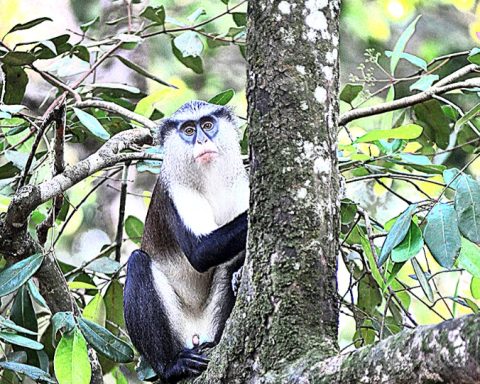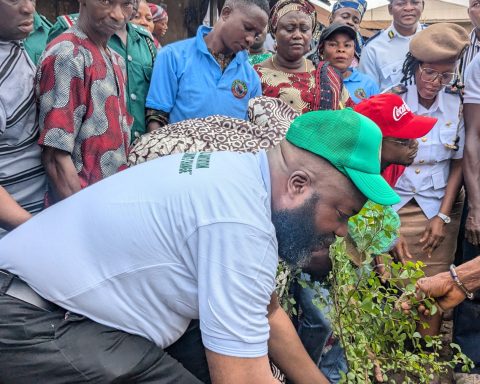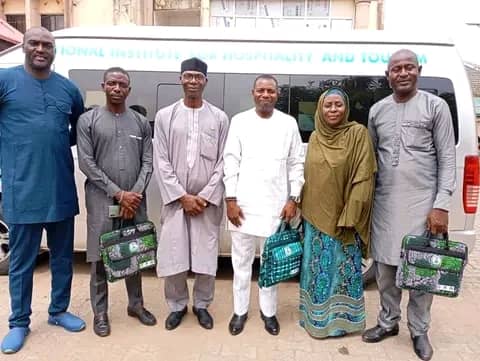
Tourism Icon, Otunba Olawanle Akinboboye has presented Mountaineering & Rock Climbing, as his tourism product for week 33.
According to him, when you want to turn a tourist attraction into a tourism destination, you need to provide activities that leverage off the attraction and which provide the tourist with a life experience that enhances his or her visit to the attraction.
He then noted that Nigeria has various terrains, which include flat savannah lands, sandy beaches, dense tropical forests, swampy mangroves, rocky outcrops and mountains.

The country’s varied geography therefore provides tourism entrepreneurs with an opportunity to offer tourism products that cater to specific and popular specialist sporting activities.
Otunba Akinboboye mentioned that this week’s tourism product; ‘Mountaineering / Rock Climbing’, was a sporting activity that required the presence of mountains or rocks as participants climb up, down or across natural rocks. The goal is to reach the summit or a specified end point.
The nature of the activity has given rise to social clubs and in addition to the non – competitive climbs undertaken by individuals or friend groups, sporting competitions are held at various locations worldwide. The IFSC Climbing World Championships are the biennial (i.e. held once every two years) world championship event for competition climbing organized by the International Federation of Sports Climbing and determines the male and female world champions in the three disciplines of competition climbing.

Otunba Akinboboye revealed that the core difference between rocks and mountains is that a rock, which is comprised of one or more types of minerals, is normally smaller than a mountain, which mountain typically has steep slopes and a peak.
He then mentioned that the highest mountain in Africa is Mount Kilimanjaro. In 2013, Tanzania generated income of over US $51 million from adventure tourists who climbed ( or attempted to climb ) the 19,340 ft { 5,895 metres ) mountain, which is the fourth highest mountain in the world. This mountain, unlike many other mountains, can be climbed without ropes or harnesses. This attracts many who want the kudos of climbing a mountain without having the skills to use the usual mountain gear of ropes, crampons and harnesses.
The current cost of a tour package to climb Kilimanjaro ranges from US$1373 – US$2670 per person if using the Marangu or Coca-cola route, which amount does not include the tips normally given to the accompanying guides and porters.
Otunba Akinboboye noted that the mountain provided employment for thousands of Tanzanians who acted as guides and porters to the climbing enthusiasts visiting the mountain.
Otunba Akinboboye then revealed that Nigeria’s highest mountain, Gangirwal ( the mountain of death) stands at 7,963 ft (2,419 m) and is found in the Adamawa mountains in a remote corner of Gashaka-Gumti National Park (GGNP). Sadly, the visitor numbers to this park are very low ( less than 50 per annum) a fact he attributed to perceived security challenges, a lack of publicity and a failure to market the mountain and park internationally and particularly as a challenge for climbing enthusiasts.

Otunba Akinboboye also referred to a number of well known rocks that included Zuma Rock in Niger State which is 980 ft ( 300 metres ) high, Olumo Rock in Abeokuta which is 138 metres high and The Idanre Hills which are 3000ft above sea level.
Interestingly, the Idanre hills can be climbed using 682 steps hewn into the rock, which is similar to the first stage of the Marangu route on Mount Kilamanjiro, where climbers use steps hewn into the mountain to reach Base Camp 1.
Otunba Akinboboye noted that, in promoting tourism products we need to take advantage of our advantages. He then observed that, based on what he had seen in Idanre, the local community were comfortable climbing the hills that surrounded their town. They therefore provided a ready made source of guides.
The educational level of such guides was immaterial, so the promoters of the product could easily create job opportunities for local communities particularly among their youths.
Otunba Akinboboye emphasized that if we want to grow tourism in Nigeria leveraging off the international tourist market, we have to offer a plethora of products so as to increase the interest in visiting Nigeria.
He hopes that this article would pique the interest of young tourism entrepreneurs who would consider offering a new product ( Mountaineering or Rock Climbing in Nigeria ) to a jaded international audience that is constantly looking for new life experiences that will provide stories that can constitute dinner conversations in the years to come.

































